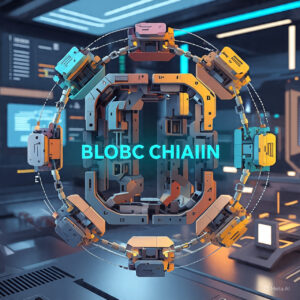
Kerala, one of India’s most technologically progressive states, is embracing blockchain technology to create a secure, transparent, and efficient digital government infrastructure. As part of the broader Digital Kerala initiative, the state is integrating blockchain across key public sectors—education, healthcare, finance, taxation, and urban development—positioning itself as a leader in e-governance innovation.
What is Blockchain and Why is it Important for Governance?
Blockchain is a decentralized digital ledger that records transactions in a secure, tamper-proof manner. Every entry is timestamped and irreversible, ensuring complete transparency and accountability.
In governance, this technology ensures:
-
Reduced corruption and fraud
-
Real-time access to verified data
-
Automation of services
-
Improved public trust
-
Lower administrative costs
By making data immutable and accessible only through authorized channels, blockchain strengthens the foundation of digital public services.
Core Benefits of Blockchain in Digital Kerala
1. Secure Data Storage
Blockchain enables the secure storage of citizen data, including health records, land ownership, academic credentials, and identity documents, protecting them from hacking or tampering.
2. Process Automation
Through smart contracts, many government processes—like issuing certificates, managing welfare schemes, or handling applications—are automated, reducing human error and delays.
3. Lower Operational Costs
By streamlining workflows and reducing paperwork, blockchain helps the government cut down on resource use, saving time and money.
4. Fraud and Corruption Prevention
Immutable records eliminate the scope for tampering or backdated changes, reducing opportunities for bribery, fake entries, or unauthorized modifications.
5. Enhanced Transparency and Trust
All blockchain entries are traceable and verifiable. This transparency fosters citizen trust in public systems and services.
Transforming Governance: Key Blockchain Initiatives in Kerala
1. Smart Cities
Kerala is integrating blockchain with IoT systems to improve the management of public utilities, waste collection, traffic, and citizen feedback systems. This ensures data interoperability and traceability for urban services.
2. Banking and RTGS Systems
Blockchain enhances the efficiency and security of Real-Time Gross Settlement (RTGS) systems, especially in handling large-volume transactions for government payments and subsidies.
3. Education and Credential Verification
Blockchain allows educational institutions to issue and store certificates in digital wallets. Employers and universities can instantly verify credentials without requiring physical copies, thus eliminating fake degrees.
4. Vaccination and Health Record Management
Healthcare systems use blockchain to securely record vaccination data, streamline the distribution of benefits, and enable data sharing across departments without compromising patient privacy.
5. Student Loans and Grants
Smart contracts automatically process applications, verify eligibility, track disbursement, and monitor compliance for student loans and scholarships, ensuring only qualified candidates receive funds.
6. Payroll and Tax Collection
Blockchain automates payroll processes for government employees and simplifies income tax deduction and provident fund contributions, reducing discrepancies and ensuring accurate payments.
Kerala’s Ecosystem: A Foundation for Blockchain Growth
Several initiatives are supporting Kerala’s blockchain transformation:
-
Kerala Blockchain Academy (KBA): Offers training programs and research in blockchain development.
-
Kerala Startup Mission (KSUM): Fosters blockchain startups in fields like agriculture, law, and health.
-
Rebuild Kerala Development Programme (RKDP): Implements blockchain for fund utilization, monitoring, and disaster recovery transparency.
These initiatives provide the technical backbone, talent pool, and innovation hubs necessary for long-term success in digital governance.
Impact on Citizens and Public Services
Blockchain is transforming how citizens interact with the government in several impactful ways:
-
Faster Service Delivery: Whether it’s land registration, document issuance, or welfare distribution, blockchain eliminates unnecessary delays.
-
Reliable Recordkeeping: Citizens can rely on digital records for education, property ownership, and health services without fear of loss or forgery.
-
Inclusive Governance: By removing intermediaries and automating compliance, blockchain makes public services more accessible and fair.
-
Better Crisis Response: In emergencies, blockchain enables real-time resource tracking and transparent fund allocation.
Kerala: Leading India’s Blockchain-Driven Future
While several Indian states are exploring blockchain through pilot projects, Kerala is moving toward full-scale adoption. Its approach aligns with the national vision of Digital India, aiming for efficient, citizen-first governance using emerging technologies.
Sectors Poised for Maximum Impact:
-
Education – Secure and verifiable academic records
-
Healthcare – Unified digital health histories
-
Finance – Transparent fund flow in public subsidies
-
Taxation – Streamlined payroll and income tax operations
-
Urban Development – Transparent smart city infrastructure
By integrating blockchain across these domains, Kerala sets a precedent for scalable, future-ready public service models.
Conclusion: Blockchain as the Backbone of Digital Kerala
Kerala’s integration of blockchain is more than a technological upgrade—it’s a transformation in how government systems are built, accessed, and trusted.
For citizens, this means:
-
Faster access to services
-
Reduced corruption and human error
-
Increased data privacy and empowerment
For the government, this means:
-
Efficient resource utilization
-
Cost savings
-
Better policy-making supported by real-time, accurate data
By embracing blockchain, Digital Kerala becomes more than a slogan—it becomes a model for modern, transparent, and citizen-centric governance. As blockchain continues to mature, Kerala is paving the way for how technology can serve the people in the most ethical, secure, and effective way possible.

Leave a Reply